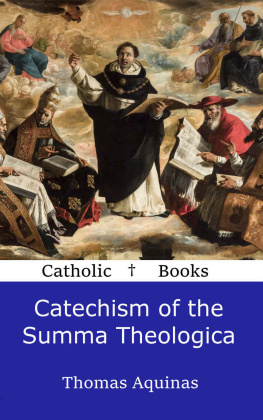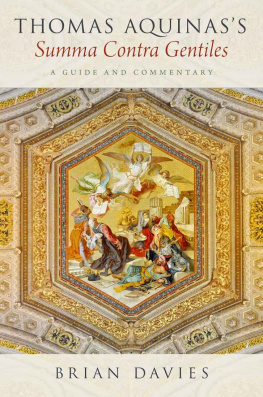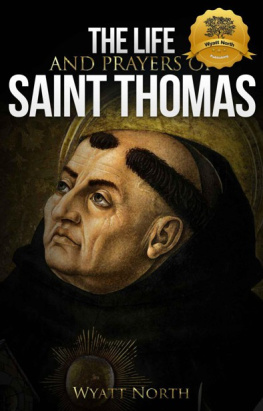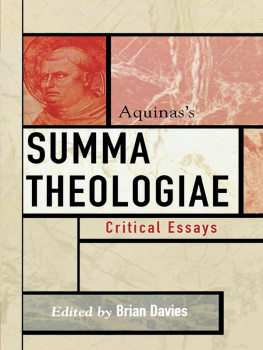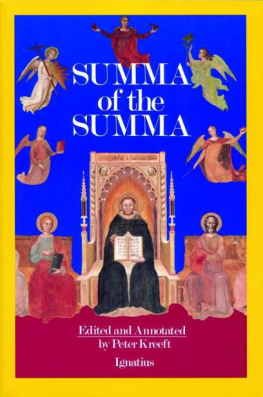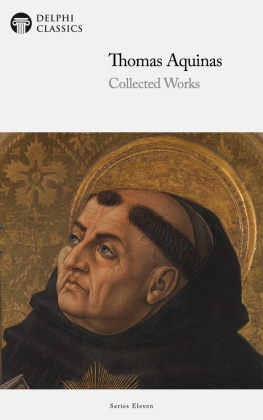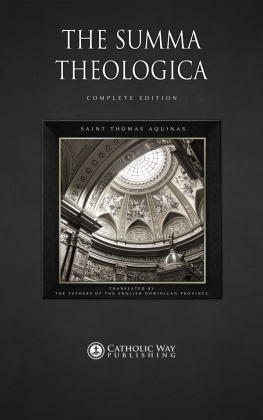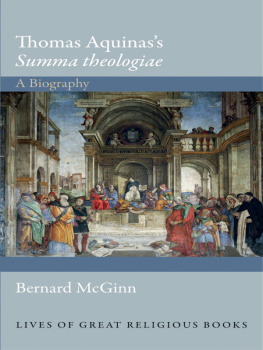Thomas Aquinas [Aquinas - Catechism of the Summa Theologica
Here you can read online Thomas Aquinas [Aquinas - Catechism of the Summa Theologica full text of the book (entire story) in english for free. Download pdf and epub, get meaning, cover and reviews about this ebook. year: 2016, publisher: Catholic † Books, genre: Religion. Description of the work, (preface) as well as reviews are available. Best literature library LitArk.com created for fans of good reading and offers a wide selection of genres:
Romance novel
Science fiction
Adventure
Detective
Science
History
Home and family
Prose
Art
Politics
Computer
Non-fiction
Religion
Business
Children
Humor
Choose a favorite category and find really read worthwhile books. Enjoy immersion in the world of imagination, feel the emotions of the characters or learn something new for yourself, make an fascinating discovery.
- Book:Catechism of the Summa Theologica
- Author:
- Publisher:Catholic † Books
- Genre:
- Year:2016
- Rating:3 / 5
- Favourites:Add to favourites
- Your mark:
- 60
- 1
- 2
- 3
- 4
- 5
Catechism of the Summa Theologica: summary, description and annotation
We offer to read an annotation, description, summary or preface (depends on what the author of the book "Catechism of the Summa Theologica" wrote himself). If you haven't found the necessary information about the book — write in the comments, we will try to find it.
Thomas Aquinas [Aquinas: author's other books
Who wrote Catechism of the Summa Theologica? Find out the surname, the name of the author of the book and a list of all author's works by series.
Catechism of the Summa Theologica — read online for free the complete book (whole text) full work
Below is the text of the book, divided by pages. System saving the place of the last page read, allows you to conveniently read the book "Catechism of the Summa Theologica" online for free, without having to search again every time where you left off. Put a bookmark, and you can go to the page where you finished reading at any time.
Font size:
Interval:
Bookmark:
Of
Translated by
NIHIL OBSTAT:
F. Thomas Bergh, O.S.B.,
Censor Deputatus.
IMPRIMATUR:
Edm. Can. Surmont,
Vicarius Generalis.
Westmonasterii,
Die 8 Junii, 1922.
R. P. THOMAS PGUES, O.P.
Master in theology
member of the Roman Academy of St. Thomas Aquinas
formerly professor of St. Thomas at the Collegio Angelico, Rome
now regent of studies at St. Maximin, France.
ADAPTED FROM THE FRENCH AND
DONE INTO ENGLISH BY AELRED WHITACRE, O.P.
"Deriventur fontes tui foras; et in plateis aquas tuas divide."Prov. V. 16.
New York, Cincinnati, Chicago
Benzinger Brothers
| Printers to the Holy Apostolic See | Publishers of Benzinger's Magazine |
| 1922 |
Beloved Son,
Greeting and Apostolic Benediction.
The manifold honours paid by the Holy See to St. Thomas Aquinas exclude for ever any doubt from the mind of Catholics with regard to his being raised up by God as the Master of Doctrine to be followed by the Church through all ages. It was therefore fitting that the singular wisdom of the Holy Doctor should be made accessible not only to the clergy but to the faithful in general, and to whomsoever desired to make a deeper study of the things of religion; for in very truth, the nearer one approaches to the light, so much the more is one enlightened.
Much praise is therefore due to you first of all because you have undertaken to write a commentary in your mother tongue upon the greatest work of the Angelic Doctor, viz., the Summa Theologica (the volumes already published of this work show what success has attended your labours); and, secondly, because you have recently published the Summa Theologica in the form of a catechism. Therein you have aptly accommodated the riches of the great genius to the understanding of the less instructed as well as of the learned; briefly and succinctly you have expounded the doctrine, and in the same luminous order as that of the Angelic Doctor whose treatise is more lengthy and more detailed.
We congratulate you sincerely on this fruit of your labours which shows your masterly knowledge of St. Thomas' doctrine. We hope, therefore, through your love of Holy Church that this work will bring many souls to a sound knowledge of Christian doctrine.
As a mark of the divine largess and in testimony of our own special good will we impart in all affection to you and to your pupils the Apostolic Benediction.
Given at Rome at St. Peter's the fifth day of February, 1919, in the fifth year of our Pontificate,
POPE BENEDICT XV.
The author of the original work asked me personally to translate his book into English. I have done so; but the genius of the English language did not permit a literal translation. The present book is therefore in some sense rather an adaptation than a literal translation, although the latter has been strictly adhered to wherever possible.
In the original work the answer always repeats the whole question word for word; in the cause of brevity and sometimes for clearness' sake, I have adopted the simple answer of "yes" or "no" lest the reader tire with the insistency of the ceaseless repetition.
Those readers who wish to study the doctrine more deeply will find much help in the references quoted at the end of most of the answers to the questions; they refer to the Summa Theologica itself, which has been translated literally into English by the Dominican Fathers of the English Province. To take an example: On p. 9 of this book there is the question: Does the Providence of God extend also to inanimate things? And the answer: Yes, for they are a part of God's handiwork (XXII. 2, Obj, 5). The reference here quoted means that the doctrine in its every detail is to be found in the reply to the 5th Objection of the 2nd Article of the 22nd Question of the First Part of the Summa. It should be noted that the citation of "First Part" is not added to the quotation for the simple reason that the particular "part" of the Summa to which the quotation refers may easily be found by consulting the table of Contents. Moreover, whenever necessary and in order to give additional strength to the doctrines of St. Thomas, reference has been made to the new Code of Canon Law; e.g., on p. 289 (Code, Canon 1036). Thus this work is brought up to date.
AE. W.
ROME,
Feast of St. Nicholas
(December 6, 1921).
(SOVEREIGN BEING; CAUSE AND LORD OF ALL THINGS)
THE SECOND PART: OF MAN
(WHO CAME FROM GOD AND WHO MUST RETURN TO HIM)
(THE SOVEREIGN BEING; THE SOURCE AND MASTER OF ALL THINGS)
The Divine Nature and Attributes.
The Blessed Trinity.
The Creation: Angels, the World, Man.
The Divine Government.
Does God exist?
Yes, God exists (II.).
Why do you say that God exists? (II. 3).
Because if God did not exist, nothing would exist.
How do you prove that if God did not exist nothing would exist?
It is proved by this argument: That which exists through God only, would not exist if God did not exist. But whatever exists that is not God, exists through God only. Therefore, if God did not exist nothing would exist.
But how do you prove that whatever exists that is not God, exists through God only?
By this argument: Final analysis shows that that which does not exist of itself, can only exist through some other which exists of itself; and this latter we call God. But whatever exists that is not God, does not exist of itself. Therefore final analysis shows that whatever exists that is not God, exists through God only.
But how do you prove that whatever exists that is not God, does not exist of itself?
By this argument: That does not exist of itself, which has need of some other. But whatever exists that is not God, has need of some other. Therefore whatever exists that is not God, does not exist of itself.
But why is it that whatsoever has need of another, does not exist of itself?
Because that which exists of itself, neither depends nor could it depend upon anything or anybody; on the other hand, whatever has need of something or somebody, depends upon this something or this somebody.
But why do you assert that what exists of itself neither depends nor could depend on something or on somebody?
Because, existing of itself, it has everything in itself and through itself, and can receive nothing either from anything or from anybody.
Therefore every existing thing that has need of some other, manifestly proves by its very existence that God exists?
Yes. Every existing thing that has need of some other manifestly proves by its very existence that God exists.
What then do those say who deny the existence of God?
They say that what has need of all has need of nothing, and conversely.
But surely that is a contradiction?
Precisely; one cannot deny God without falling into contradiction.
Font size:
Interval:
Bookmark:
Similar books «Catechism of the Summa Theologica»
Look at similar books to Catechism of the Summa Theologica. We have selected literature similar in name and meaning in the hope of providing readers with more options to find new, interesting, not yet read works.
Discussion, reviews of the book Catechism of the Summa Theologica and just readers' own opinions. Leave your comments, write what you think about the work, its meaning or the main characters. Specify what exactly you liked and what you didn't like, and why you think so.

